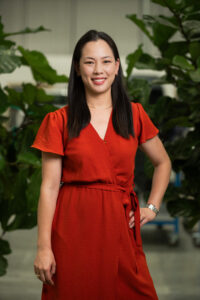Catching up with Karin Kuo, Senior Vice President of People at Vast.
Transformative innovation starts with people, and strong networks connect us to new ideas that might otherwise be out of reach. But networks don’t build themselves. At Luminary Labs, we understand the power of an engaged community, and we devote time and energy to building connections and maintaining relationships with a diverse network that includes clients, friends, subject matter experts, thought partners — and a truly impressive cohort of alumni.
We are incredibly proud of the Luminary Labs alumni community, and as we look ahead to our company’s 15-year anniversary, we’re launching a new series of interviews to catch up with inspiring Luminaries. Our first Alumni Spotlight features Karin Kuo, who is now Senior Vice President of People at Vast, a company building the first artificial-gravity crewed space stations.

Karin Kuo, Senior Vice President of People at Vast.
Karin joined Luminary Labs in 2014 and worked on the Strategy team for two years, supporting client engagements and internal initiatives at a critical moment of company growth. Since then, Karin has focused on scaling multiple tech and aerospace startups, leading recruiting and people operations teams at Relativity Space, Onica, and Grindr. As a member of the executive team at Vast, she sets the company’s people strategy and has led an ambitious expansion; founded in 2021, Vast now employs nearly 400 people and has plans for continued growth this year.
Like many Luminary Labs alumni, Karin has stayed in touch and been an important part of our network. We recently worked with Karin to coordinate Vast’s sponsorship of the Your Place in Space Challenge, a U.S. Department of Education challenge that invited high schools to create new solutions for space. Experts from Vast offered mentorship to winning teams from schools across the country.
We recently talked with Karin about her Luminary Labs memories, her leadership role at Vast, and more. Karin reflected on her time at our company and shared insights on what it takes to help innovative companies accomplish ambitious goals.
What did you work on at Luminary Labs?
The company was much smaller when I was on the team, and I was able to support multiple pillars of work: internal structure-building with the company, business development, and of course, client work. Working across those different pillars was really fun for me.
I helped Janna (Luminary Labs Partner and President) develop Luminary Labs’ career trajectories, define the hiring process, and develop our performance management systems. On the business development front, I supported a few key proposals, including our early contracts with NASA and the U.S. Department of Education. It was a pivotal moment when we were a brand new player for these federal customers. With first-time clients and long-term contracts, it was critical to earn and develop trust early on and maintain it over time. It’s so amazing to see that 10 years later, NASA and the Department of Education are still clients of Luminary Labs. It was a lot of juggling and prioritization — but a lot of fun and really great learning at the time.
What is something you learned at Luminary Labs that you continue to value today?
Sara (Luminary Labs Founding Partner and CEO) often shared that constraints are not a bad thing, and constraints can actually spur significant innovation. Being truly innovative is not actually about having endless resources and endless money. Sometimes, the most innovative solutions come from when you’re the most resource-constrained.
That’s one of my favorite lessons that I’ve taken to every role. Especially since I’ve pivoted and gone back to serving government clients for the past four years in aerospace. Constraints can be helpful, especially when timelines are very relevant and sometimes very short — the same is true in a startup environment.
What’s the most exciting thing about your current work?
I think what’s most exciting is being able to welcome so many new team members and working toward this incredibly ambitious vision and mission. Artificial-gravity space stations have never been done, but they could enable humans to live in space for longer periods and unlock greater and deeper space exploration, enabling humans to get to Mars or further into and beyond our solar system. You see and hear about artificial gravity in movies and science-fiction novels, but we’re actually trying to do it, and it’s something that we can achieve within our lifetime. Being a part of that is incredibly special. Everyone here has that intrinsic motivation.
The second most exciting thing is just being able to scale the company from its infant stages. We’re evolving through our different stages, and with the constant growth and change, I’m lucky to have a really great leadership team to partner with along this journey. That makes it so much more enjoyable.
We’d love to hear about an underrated or underhyped issue you care about — what do you wish more people were thinking about?
The little things matter. Sara and Janna always encourage people to be authentic at work and not try to hide things, because life happens. And I think no matter how big or small an organization is, there are ways it can take care of its people.
Sara was very proud — and I was very proud of this, too — when Luminary Labs was able to offer a paid parental leave policy, even when the company had fewer than 20 employees. After Luminary Labs, I pivoted my career from strategy and innovation consulting and have been leading startup organizations from a recruiting and HR perspective for nearly the past 10 years. At every single organization — Grindr, Onica, Relativity, and now at Vast — I’ve changed the parental leave policy to make it much more equitable for all our new parents. It’s making an impact for our employees, our industries, and society as a whole — and the hidden beauty is that it’s not very hard to do. There is a business case for paid parental leave; it doesn’t actually cost the company that much. In fact, the company will likely see savings in terms of money, time, and employee engagement. You need a bold and supportive leadership team to back it.
Is there something you’ve read, seen, or listened to lately that is sticking with you?
I have a 2-year-old and a 4-year-old, and my kids are really into a cartoon called Bluey. There are a lot of good life lessons in those episodes, including reminders to not take yourself too seriously. And another big one is that family is so important. I think companies often forget about that. Recently, a colleague was dealing with a difficult family situation and they felt bad about needing to step away from work. I didn’t hesitate to step in so they could be with their family. Those Bluey episodes sometimes bring things like this to light in such an approachable way.
I’ve also been listening to conversations and thinking about AI right now, and in particular, about what AI will mean for jobs. Jobs for humans are not going to go away. They may become more automated, but you will still need humans to power those automated jobs. It’s really important not to dismiss this technology, but instead try to understand how AI will shift what you are doing so that you can adapt and still be relevant — regardless of your role or industry. Whether it’s AI or another technology, this applies for everyone in the workforce.
Tell us about something that brings you joy.
Reconnecting with old friends and colleagues brings so much good soul, good mind, good heart. Being able to reconnect with some great Luminary folks is always good.
Something else that brings me joy? Having peace and quiet to just think, whether it’s for work or for myself, or just reflecting on the good, the bad, and the ugly in the world. It doesn’t happen often, and I need to create more space for it. Doing yoga twice a week brings me a lot of joy; it’s mind-, health-, and heart-nourishing as well. And a really good al pastor taco brings me a lot of joy — I think most Luminaries will appreciate that.


